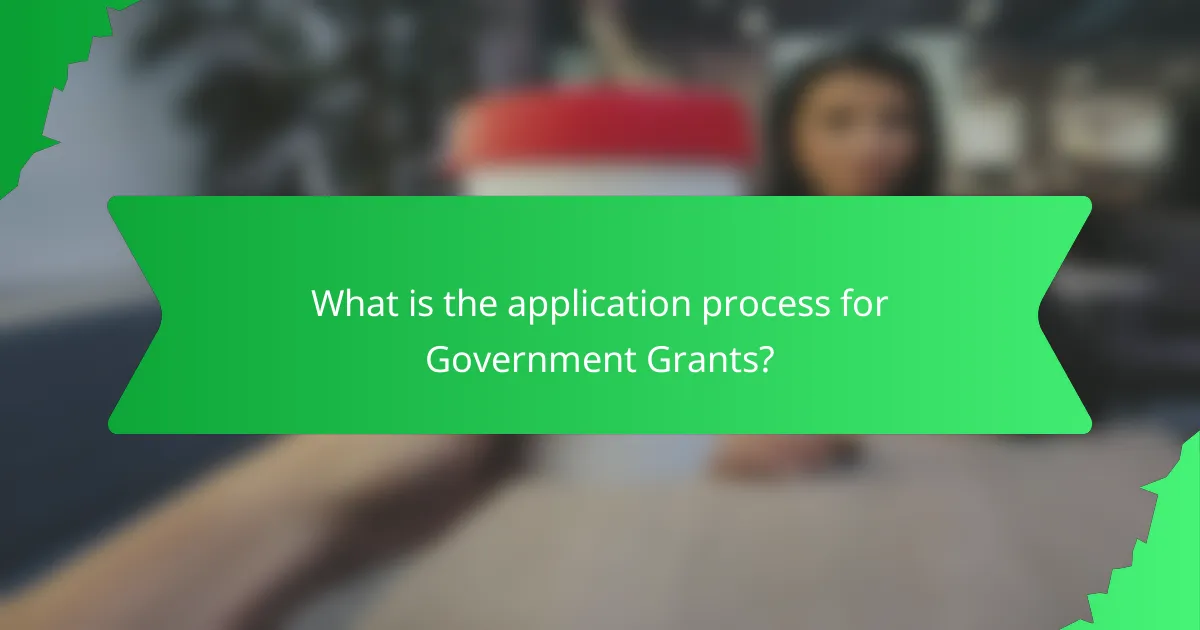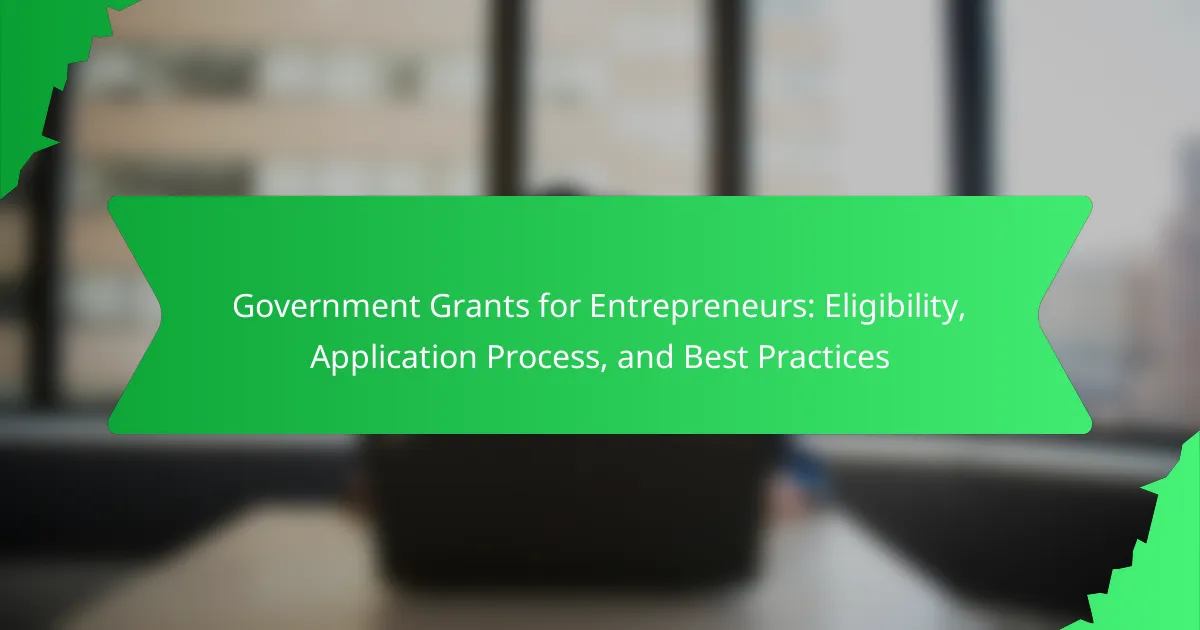Government grants for entrepreneurs are non-repayable funds provided by governmental bodies to support business initiatives, particularly for startups and small businesses. These grants aim to promote innovation, create jobs, and stimulate economic development, with various agencies at federal, state, and local levels offering them based on specific eligibility criteria. The article outlines the application process for securing these grants, detailing essential steps such as identifying suitable programs, reviewing eligibility requirements, and preparing necessary documentation. Additionally, it highlights best practices for entrepreneurs, including thorough research, the importance of a comprehensive business plan, and effective networking with grant administrators to enhance their chances of approval.

What are Government Grants for Entrepreneurs?
Government grants for entrepreneurs are funds provided by the government to support business initiatives. These grants do not require repayment, making them a valuable resource for startups and small businesses. They are typically aimed at fostering innovation, job creation, and economic development. Various government agencies at federal, state, and local levels offer these grants. Eligibility criteria often include business type, location, and project purpose. For example, the Small Business Administration (SBA) provides grants for specific industries and demographics. Entrepreneurs can use these funds for research, development, or operational costs. By securing a government grant, entrepreneurs can reduce financial burdens and enhance their growth potential.
How do Government Grants support entrepreneurial initiatives?
Government grants support entrepreneurial initiatives by providing financial assistance without the need for repayment. These grants help startups and small businesses access capital for development, innovation, and growth. They often focus on specific sectors such as technology, renewable energy, and healthcare. Government grants can cover expenses like research and development, equipment purchases, and operational costs. According to the Small Business Administration, billions of dollars are allocated annually to support diverse entrepreneurial projects. This funding enables entrepreneurs to launch and scale their businesses, fostering economic growth and job creation.
What types of businesses can benefit from Government Grants?
Nonprofit organizations, small businesses, and startups can benefit from government grants. Nonprofits often receive funding for community projects and services. Small businesses may access grants for innovation and expansion. Startups frequently qualify for funding aimed at fostering entrepreneurship. Additionally, businesses in specific sectors like technology, healthcare, and agriculture often receive targeted grants. These grants support research, development, and sustainability initiatives. According to the Small Business Administration, over $30 billion is allocated annually to support small business grants.
What are the common purposes for which Government Grants are awarded?
Government grants are awarded for various common purposes. These include supporting research and development projects. Grants also fund education and training programs. Economic development initiatives often receive grant funding. Environmental protection projects are another common area of support. Additionally, grants assist in community development and infrastructure improvements. Non-profit organizations frequently benefit from grants for social services. Lastly, grants may be awarded for health-related projects and public health initiatives.
What are the eligibility criteria for Government Grants?
Eligibility criteria for government grants typically include being a registered business entity. Applicants must demonstrate a clear business purpose aligned with the grant’s objectives. Many grants require a specific industry focus, such as technology or agriculture. Financial stability and a viable business plan are often necessary. Some grants may also require matching funds or a commitment to job creation. Additionally, geographic location can influence eligibility, as some grants are region-specific. Compliance with regulatory requirements is crucial for all applicants. Documentation of past performance may also be required to establish credibility.
How do different types of grants vary in eligibility requirements?
Different types of grants vary in eligibility requirements based on their purpose and funding source. Government grants often target specific sectors such as education, healthcare, or small business development. For instance, federal grants may require applicants to demonstrate a certain level of innovation or community impact. State grants might focus on local job creation or economic development.
Nonprofit grants typically require proof of nonprofit status and alignment with the funder’s mission. Educational grants often necessitate enrollment in an accredited institution or specific academic performance criteria.
Additionally, some grants are designed for specific demographics, such as women or minority-owned businesses, while others may have geographic restrictions. Each grant’s eligibility criteria are outlined in its guidelines, ensuring applicants understand the specific qualifications needed to apply.
What documentation is typically required to prove eligibility?
Documentation typically required to prove eligibility for government grants includes a completed application form, proof of business registration, and financial statements. Applicants must provide identification documents such as a driver’s license or passport. Tax returns for the past few years are often requested to assess financial stability. Additionally, a business plan detailing the project and its goals may be necessary. Some grants require specific certifications or licenses relevant to the industry. Compliance with local, state, and federal regulations must also be documented. These requirements ensure that applicants meet the necessary criteria for funding.
Why are Government Grants important for entrepreneurs?
Government grants are important for entrepreneurs because they provide essential funding without the need for repayment. This financial support can help cover startup costs, research and development, and operational expenses. Grants often target specific industries or projects, encouraging innovation and economic growth. For instance, the U.S. Small Business Administration offers various grants aimed at fostering small business development. Access to these funds can significantly reduce financial risk for entrepreneurs, allowing them to focus on growth and sustainability. Additionally, government grants can enhance credibility and attract further investment opportunities.
How do Government Grants impact business growth and innovation?
Government grants significantly enhance business growth and innovation. They provide essential funding that reduces financial barriers for startups and small enterprises. This funding allows businesses to invest in research and development, leading to innovative products and services. According to the National Small Business Association, 70% of small businesses that received grants reported increased revenue. Grants also enable companies to hire skilled professionals, fostering talent and expertise. Furthermore, government grants often come with mentorship and resources, guiding businesses toward sustainable growth. Overall, these grants are critical in stimulating economic development and fostering a culture of innovation.
What are the long-term benefits of receiving Government Grants?
Government grants provide significant long-term benefits for recipients. They enable businesses to fund research and development without incurring debt. This financial support can lead to innovation and improved products or services. Additionally, government grants can enhance a business’s credibility. Receiving a grant often signals to investors and customers that the business is viable. Furthermore, these grants can create job opportunities, contributing to economic growth. According to the U.S. Small Business Administration, businesses that receive grants may experience increased revenue over time. This financial boost can lead to sustainable growth and expansion. Overall, government grants can serve as a catalyst for long-term business success.

What is the application process for Government Grants?
The application process for government grants involves several key steps. First, identify the specific grant program that aligns with your project needs. Next, review the eligibility requirements to ensure your business qualifies. Then, gather necessary documentation, such as financial statements and project proposals. After that, complete the application form accurately. Submit the application before the deadline specified by the grant program. Finally, follow up to confirm receipt and inquire about the review timeline. These steps ensure a structured approach to securing funding.
How can entrepreneurs find available Government Grants?
Entrepreneurs can find available government grants by researching online databases and government websites. The U.S. Small Business Administration (SBA) provides valuable resources. Websites like Grants.gov list federal grant opportunities. State and local government websites also offer information on regional grants. Networking with local business associations can uncover additional resources. Attending workshops and seminars focused on funding can provide insights. Utilizing social media groups dedicated to entrepreneurship may reveal grant opportunities. Additionally, consulting with a grant writer can enhance the chances of finding and securing grants.
What resources are available for researching grant opportunities?
Federal grant databases are essential resources for researching grant opportunities. The Grants.gov website provides access to federal grant listings. It allows users to search by agency, category, and eligibility criteria. State government websites also offer grant information tailored to local entrepreneurs. Nonprofit organizations often maintain databases of grants available for specific sectors. Additionally, the Foundation Center provides a comprehensive database of private and corporate grants. Academic institutions may have grant offices that offer resources and support for grant research. Networking with industry associations can also reveal grant opportunities. These resources collectively facilitate access to various funding options for entrepreneurs.
How do entrepreneurs assess which grants are suitable for them?
Entrepreneurs assess suitable grants by evaluating their business needs and eligibility criteria. They begin by identifying their specific funding requirements. This includes understanding the purpose of the grant and how it aligns with their business goals. Next, entrepreneurs research available grants from government agencies and private organizations. They focus on the eligibility requirements such as industry type, business size, and geographic location. Entrepreneurs also consider the application process, including deadlines and required documentation. Additionally, they analyze the grant’s terms and conditions to ensure compliance. Resources like grant databases and local business development centers assist in this evaluation. By systematically matching their needs with grant offerings, entrepreneurs can select the most appropriate funding sources.
What steps are involved in the Government Grant application process?
The Government Grant application process involves several key steps. First, identify the specific grant program that suits your needs. Next, review the eligibility requirements outlined by the funding agency. Then, gather necessary documentation, such as financial statements and project proposals. After that, complete the application form accurately. Once completed, submit the application before the deadline. Following submission, monitor the application status and be prepared to provide additional information if requested. Finally, if awarded, comply with any reporting requirements as specified by the grantor. These steps ensure a structured approach to securing government funding for entrepreneurial ventures.
What are the key components of a successful grant proposal?
A successful grant proposal includes several key components. First, a clear and concise executive summary outlines the project’s purpose and goals. Next, a detailed project description explains the methods and activities planned. This section should include specific objectives and expected outcomes. Additionally, a budget section provides a breakdown of costs and funding sources. A strong statement of need demonstrates the importance of the project and its impact. Furthermore, the proposal should include an evaluation plan to assess the project’s effectiveness. Lastly, organizational information highlights the applicant’s qualifications and capacity to manage the project. These components are essential for conveying a compelling case to funders.
How can entrepreneurs prepare for grant interviews or presentations?
Entrepreneurs can prepare for grant interviews or presentations by conducting thorough research on the grant and its requirements. Understanding the specific goals and criteria of the grant is essential. Entrepreneurs should also practice their pitch to communicate their ideas clearly and confidently. Creating a concise presentation that highlights key points can help maintain focus. Additionally, anticipating potential questions from the grant committee allows for better responses. Entrepreneurs should gather relevant data and examples to support their proposal. Dressing professionally and arriving early to the interview can make a positive impression. Finally, following up with a thank-you note reinforces professionalism and gratitude.
What common mistakes should entrepreneurs avoid during the application process?
Entrepreneurs should avoid several common mistakes during the application process for government grants. One mistake is not thoroughly researching the grant requirements. Each grant has specific eligibility criteria and application guidelines. Failing to understand these can lead to disqualification. Another mistake is submitting incomplete applications. Incomplete applications are often rejected immediately. Entrepreneurs should ensure all required documents are included and properly formatted. Additionally, many entrepreneurs underestimate the importance of a compelling narrative. A clear and persuasive project description is crucial for funding success. Lastly, neglecting to follow deadlines is a frequent error. Missing deadlines can result in lost opportunities for funding.
How can entrepreneurs ensure they meet all application deadlines?
Entrepreneurs can ensure they meet all application deadlines by implementing a structured timeline for each application. This timeline should include all key dates, such as submission deadlines and any required documentation dates. Using project management tools can help track these deadlines effectively. Regular reminders can be set to alert entrepreneurs ahead of time. Additionally, breaking down the application process into smaller tasks can make it more manageable. Allocating sufficient time for each section of the application is crucial. Research shows that entrepreneurs who plan ahead are 30% more likely to submit applications on time. Engaging with mentors or peers for accountability can further enhance adherence to deadlines.
What are the pitfalls of inadequate documentation or unclear proposals?
Inadequate documentation or unclear proposals can lead to significant pitfalls in securing government grants. These pitfalls include increased chances of rejection due to lack of clarity. Reviewers may find it difficult to assess the project’s viability without clear information. This can result in misunderstandings about the project’s goals and objectives. Insufficient details may also lead to misalignment with grant requirements. Consequently, applicants may miss critical deadlines or fail to provide necessary supporting documents. This can ultimately waste time and resources for both the applicant and the funding agency. Clear and thorough documentation is essential to convey the project’s potential impact and feasibility.

What best practices should entrepreneurs follow when applying for Government Grants?
Entrepreneurs should follow several best practices when applying for government grants. First, they must thoroughly research available grants. Understanding eligibility criteria is crucial for a successful application. Next, entrepreneurs should prepare a comprehensive business plan. A well-structured plan demonstrates the viability of the project. Additionally, they should ensure all documentation is complete and accurate. Incomplete applications often lead to rejection.
Networking with grant administrators can provide valuable insights. Engaging with others who have successfully obtained grants can also be beneficial. Entrepreneurs should pay attention to deadlines and submit applications early. This approach allows time for revisions and avoids last-minute issues. Finally, entrepreneurs should be prepared for follow-up inquiries from grant agencies. Being responsive can enhance their chances of approval.
How can entrepreneurs strengthen their grant applications?
Entrepreneurs can strengthen their grant applications by clearly defining their project goals. They should provide a detailed budget that outlines how funds will be used. Demonstrating a strong understanding of the target market is essential. Entrepreneurs must also showcase their qualifications and relevant experience. Including letters of support from partners or stakeholders can enhance credibility. They should ensure compliance with all grant guidelines and requirements. Using data and evidence to support claims will make the application more compelling. A well-structured and error-free application reflects professionalism and attention to detail.
What role does networking play in the grant application process?
Networking plays a crucial role in the grant application process. It helps applicants connect with funding organizations and other stakeholders. Building relationships can provide insights into grant requirements and priorities. Networking often leads to collaborative opportunities that strengthen proposals. Engaging with peers can also offer feedback on application strategies. Additionally, networking can enhance visibility and credibility in the grant community. Research indicates that successful grant applicants frequently rely on their networks for support and information. This collaborative approach increases the likelihood of securing funding.
How can entrepreneurs leverage feedback from previous applications?
Entrepreneurs can leverage feedback from previous applications to improve future submissions. They should analyze comments and scores from reviewers to identify strengths and weaknesses. This allows them to understand which aspects of their proposals resonated well and which did not. Additionally, entrepreneurs can adjust their project goals and objectives based on this feedback. By incorporating constructive criticism, they can enhance clarity and alignment with grant criteria. Research indicates that 70% of successful grant applicants use previous feedback to refine their proposals. This iterative process increases the likelihood of securing funding in subsequent applications.
What strategies can entrepreneurs use to maximize their chances of success?
Entrepreneurs can maximize their chances of success by developing a solid business plan. A well-structured plan outlines goals, strategies, and financial projections. This clarity helps attract investors and secure funding. Additionally, networking with industry professionals can provide valuable insights and opportunities. Engaging in continuous learning and adapting to market changes is crucial. Research shows that businesses with mentorship support have higher success rates. Utilizing government grants can also provide financial relief and resources. Entrepreneurs should stay informed about grant eligibility and application processes to take advantage of these opportunities.
How important is follow-up communication after submitting an application?
Follow-up communication after submitting an application is crucial. It demonstrates continued interest and professionalism. Following up can clarify any questions the reviewers may have. It also provides an opportunity to reiterate the applicant’s qualifications. Research indicates that applicants who follow up are perceived as more proactive. According to a study by the National Association of Colleges and Employers, 70% of employers appreciate post-application communication. This practice can enhance the applicant’s visibility among decision-makers. Overall, effective follow-up can positively influence the outcome of the application process.
What ongoing support can entrepreneurs seek after receiving a grant?
Entrepreneurs can seek various forms of ongoing support after receiving a grant. This includes mentorship programs that provide guidance from experienced business professionals. Networking opportunities can also help entrepreneurs connect with peers and industry leaders. Access to workshops and training sessions enhances skills and knowledge relevant to their business. Additionally, entrepreneurs may consider consulting services for tailored advice on business strategies. Financial management resources can assist in effectively utilizing grant funds. Lastly, many organizations offer follow-up support to monitor progress and provide additional resources as needed. These support systems are crucial for maximizing the benefits of the grant and ensuring long-term success.
What are the key takeaways for successfully obtaining Government Grants?
Understand the eligibility requirements for government grants. Each grant has specific criteria that applicants must meet. Research thoroughly to identify grants that align with your project goals. Prepare a detailed project proposal that outlines objectives, budget, and impact. Use clear language and provide a compelling case for funding. Follow all application guidelines meticulously to avoid disqualification. Submit applications before deadlines to ensure consideration. Seek feedback on your proposal from experienced grant writers or mentors.
Government grants for entrepreneurs are financial resources provided by government entities to support business initiatives without the requirement of repayment. The article outlines the eligibility criteria, application process, and best practices for securing these grants, emphasizing their importance for startups and small businesses in fostering innovation and economic growth. It details the types of businesses that can benefit from grants, common purposes for which they are awarded, and the necessary documentation for applications. Additionally, it highlights strategies to enhance grant proposals and the significance of follow-up communication after submission, ultimately serving as a comprehensive guide for entrepreneurs seeking funding opportunities.
